Trading Day: ASX slips amid Origin, AGL woes
After a three-day winning streak, Australian stocks closed lower. Gina Rinehart takes Vulcan lithium stake. Nick Scali up on bullish outlook.

- Rinehart grabs lithium stake
- Origin downgrades forecasts
- AGL warns of $2.68bn in writedowns
- Nick Scali lifts profit, dividend
That’s all from the Trading Day blog for Thursday, February 4. After a three-day winning streak, Australian stocks closed lower, after Wall Street ended mixed, with the Dow and S&P 500 both up 0.1 per cent, but the Nasdaq slipped 0.1 per cent.
4.32pm: ASX ends 3-day winning streak
Australian shares ended a 3-day winning streak as global markets faltered and Origin and AGL warned on profits.
The S&P/ASX 200 index closed down 0.9pc at 6765.5 after falling as much as 1pc to two-day low of 6757.2.
Wall Street remained firm overnight, but S&P 500 futures went from up 0.2pc to down 0.3pc in APAC trading.
Elsewhere in the APAC region, Japan’s Nikkei 225 fell 0.9pc, China’s Shanghai Composite lst 1pc and South Korea’s KOSPI dived 1.7pc.
It came after US 10-year bond yields rose 4bps to 1.137pc overnight, near a 10-month high of 1.1855 in January.
“The momentum behind this week’s recovery in stocks was likely crimped by the move higher in risk-free rates,” said IG market analyst, Kyle Rodda.
Origin dived 6.9pc on a profit warning, making it the weakest in the ASX200 and AGL Energy fell 3.6pc on a $2.69bn writedown.
Among other significant movers CSL fell 1.8pc, Transurban fell 2.2pc, Goodman lost 2.2pc and Sydney Airport dived 3.7pc.
The BoE meeting and US initial jobless claims data are due overnight along with a meeting of US regulators “to discuss recent volatility in financial markets.”
RBA governor Philip Lowe has parliamentary testimony from 9.30am on Friday and the Statement on Monetary Policy is due at 11.30am.
Focus then turns to US non-farm payrolls data later on Friday.
4.20pm: ANZ sees “headwinds” for iron ore
ANZ senior commodity strategist, Daniel Hynes, warns that “headwinds are gathering” for iron ore prices.
“Restrictions on the property sector are likely to take the edge of steel demand growth,” he says.
“Weak margins for Chinese steel mills may lead to capacity reductions and Chinese authorities reinforcing supply side reforms.
“As such, we reiterate our 12-month price target of $US100 a tonne.”
Spot iron ore rose 1.3pc to $US152.05 on Tuesday.
Bridget Carter 3.54pm: Ladbrokes taps Morgan Stanley in addition to Macquarie Capital
Ladbrokes owner Entain has tapped Morgan Stanley as well as Macquarie Capital as part of its efforts to buy Tabcorp’s wagering arm in a cash and scrip proposal.
DataRoom understands that Entain has put forward a deal where it pays the company in Chess Depositary Interests for the wagering arm held in an Australian structure with some cash - the assumption being that cash would be the alternative.
Tabcorp has confirmed this week that it has received approaches for the business.
DataRoom revealed earlier in the week that Macquarie Capital was working with Entain and that Morgan Stanley was believed to be around the situation.
Working for Tabcorp is investment bank UBS.
Elise Shaw 3.50pm: Origin Energy could see ‘sustained downside rating pressure’
S&P Global Ratings says persistently lower earnings for Origin Energy Ltd. (BBB/Stable/A-2) from its Energy Markets segment could weigh on the credit quality of the Australia-based integrated energy company.
“We continue to expect that Origin Energy’s ratio of debt to EBITDA will increase to beyond 3.0x in fiscal 2021 (ending June 30, 2021), which underscores the critical role of the company’s balance sheet and capital management (particularly in the form of deleveraging) to maintain the current rating,” S&P Global Ratings said today.
Origin Energy has lowered its EBITDA guidance for its Energy Markets segment for fiscal 2021 to a range of $1 billion-$1.14 billion from $1.15 billion-$1.3 billion, with earnings impact expected across both electricity and natural gas segments.
“A key risk, in our view, is the lower earnings from the electricity segment, which reflects continued lower wholesale power prices as well as lower volumes due to weather conditions.
“We believe that this pressure could continue since forward wholesale power prices remain low and are likely to affect earnings for fiscal 2022. The lower forward wholesale prices are particularly a function of additional renewable capacity that is expected to enter the market as well as the continued penetration of distributed energy generation sources, such as solar rooftop panels.
“As a result, we believe that there could be some sustained downside rating pressure in the absence of a mitigating response from management. Origin Energy’s strategic response to changing market conditions to meet its target debt-to-EBITDA ratio of 2.0x-3.0x will be important for it to maintain the current rating.”
Elise Shaw 3.28pm: Aussie imports from China hit record high: CommSec
The value of metal ores and mineral exports rose 3.2 per cent in December with iron ore and concentrates exports hitting an all-time high of $12.57 billion, notes CommSec’s senior economist Ryan Felsman.
“In rolling annual terms, iron ore exports surged by 20.4 per cent to $115.77 billion in December. Iron ore export earnings have soared on strong demand from China (as well as weak ore supply from Brazil) - triggering a surge in iron ore prices to 9-year highs in late 2020.”
The world’s biggest iron ore producer, WesternAustralia, has been the prime beneficiary, says Felsman. “In fact, the rolling annual value of Western Australian exports rose by2.9 per in December to a record high $186.387 billion.”
But it wasn’t all good news on the trade front, he says.
“Despite posting a 36th successive monthly trade surplus, Australia’s exports to China fell by 2.1 per cent in December when compared with a year ago - the biggest annual decline in 4½ years - as political tensions intensified. That said, Aussie imports from China hit a record high in December. And Australia exported a record $19.15 billion of goods to our largest political ally - the US - in the year to December.
“Imports fell by 2.4 per cent in December after the easing of Covid-19 restrictions - especially in Victoria – led to a 9.3 per cent jump in goods imported in November. Capital goods exports dropped 16.1 per cent – the most in eight years (since December 2012).”
3.09pm: ASX at 2-day low; US futures slip
Australia’s share market extended its fall to a two-day low as US futures turned down.
The S&P/ASX 200 tumbled 1pc to 6757.2 on broad-based falls amid regional weakness.
An intraday bounce faltered as S&P 500 futures went from up 0.2pc to down 0.2pc.
John Durie 3.07pm: ASIC to front Parliamentary Joint Committee Feb 19
Returned ASIC chair James Shipton will have an early chance to show his wares with the Parliamentary Joint Committee due to have ASIC presenting on February 19.
Shipton returned to work on Monday in a deal that gives him the floor until a replacement is found.’
Several members of the Committee including NSW backbencher Jason Failinski and Senator Andrew Bragg have been high profile critics of ASIC under Shipton.
3.03pm: Janet Yellen to meet with US regulators on short squeeze
US Treasury Secretary Janet Yellen will meet with US regulators today on the recent tumult caused by the social-media driven short squeeze in US stocks including GameStop.
The regulators attending will include the Fed, the SEC and the CFTC, Bloomberg reports.
Presumably regulators will look at potentially increasing regulation of retail brokers.
Quentin Webb 2.57pm: Alibaba plans up to $US5bn bond sale
Alibaba Group Holding Ltd. plans to sell billions of dollars of bonds, in what will be a test of investor appetite after the e-commerce giant’s recent run-ins with Chinese authorities.
In a brief statement late Tuesday, Alibaba said it planned to issue dollar debt, including some bonds to fund sustainability-related projects, subject to market conditions. It said the deal’s total size hadn’t been fixed, nor had the bonds’ maturities, interest rates or other terms.
The deal could total up to $5 billion and include bonds with maturities as long as 40 years, according to a notice sent to investors by one of the banks handling the sale. The message was sent on Wednesday morning Hong Kong time and was seen by The Wall Street Journal.
A later notice to investors said the deal would include bonds due in 10, 20, 30 and 40 years and gave initial price guidance for yields of roughly 1.3 to 1.6 percentage points over equivalent government debt. The 20-year bonds will be so-called sustainability notes.
Alibaba shares have swung sharply in recent months, after a speech in October by founder Jack Ma prompted Chinese President Xi Jinping to call off the blockbuster listing of Ant Group Co., the company’s financial-technology affiliate.
The Wall Street Journal via Dow Jones Newswires
Perry Williams 2.48pm: Disappointment over $2.4bn electricity transmission project knockback
TransGrid and ElectraNet said they were disappointed after a $2.4bn electricity transmission project between NSW and South Australia was hit by an adverse regulatory ruling which may hobble the investors chances of securing debt for the development.
The two transmission companies wanted changes to the way they recover revenue for big capital investments so they can access cashflows from customers sooner.
Their request was knocked back by the Australian Energy Market Commission on Thursday, adding a fresh hurdle for the first direct transmission interconnector between the two states.
“While it is a disappointing outcome, we nevertheless believe these projects are in the best interests of the National Energy Market,” TransGrid chief executive Paul Italiano said. “We will continue to work with AEMC to better understand the basis of its draft decision and explore any opportunities to potentially change the outcome in the final decision. This is only one pathway to deliver these projects and we will work with our stakeholders to explore other ways of implementing the integrated system plan.”
South Australia’s ElectraNet is also studying the decision.
“ElectraNet note the AEMC’s preliminary decision and we will now take time to consider it in detail,” a spokesman said.
“The financeability rule change proposals are about bringing forward the timing of revenue recovery to support the financeability of major projects and importantly, electricity customers were not being asked to pay any more over the life of the project.”
Elise Shaw 2.39pm: Biggest jump in rural exports in 25 years: CommSec
Aussie farmers endured a torrid 2020, says CommSec’s senior economist Ryan Felsman.
“Trade tensions with China escalated following the drought, with tariffs, duties and anti-dumping measures imposed on a range of agricultural goods.
“But in a positive end to a difficult year, rural exports surged by a massive 18.4 per cent in December – the most in 25 years (since December 1995).
“Widespread rainfall boosted rural goods shipments with the value of cereal exports soaring by a whopping 75 per cent to $1.145 billion in December. In original terms, cereal and cereal preparations exports hit a record high $1.192 billion in the month.”
Eli Greenblat 1.02pm: Online retail sales slow
NAB’s online retail sales index fell by 7.1 per cent in December, from growth in November of 1.3 per cent, on a month-on-month, seasonally adjusted basis.
The bank’s monitoring of the online retail sector found that in year-on-year terms, the growth in its index slowed by 33.8 per cent from the record growth between April and November, but remained elevated relative to recent years.
NAB said takeaway food and grocery and liquor were the only categories to record growth in seasonally adjusted month-on-month terms.
The biggest fall in month-on-month growth was recorded for the largest category, homewares and appliances, which contributed heavily to the headline result. This category, however, is still up 23.2 per cent for the year.
Other large categories, department stores, personal and recreational, and fashion, also contracted along with smaller categories, games and toys, and media. Grocery returned to growth in December after contracting over the past three months.
NAB estimates that in the 12 months to December, Australians spent $44.18 billion on online retail, a level that is around 12.6 per cent of the total retail trade estimate.
Ben Wilmot 12.28pm: Centuria Office turns in solid half year profit
The Centuria Office REIT has turned in a healthy half year result with funds from operations of $57.7m and reporting solid leasing in its suburban office portfolio.
The company said first half FFO per unit was at 11.2 cents per unit and gave guidance of full year FFO guidance of between 19.4–19.9c per unit.
The company, which has been active in leasing up its portfolio, reiterated full year distribution per unit guidance of 16.5c per unit.
Grant Nichols, COF fund manager, said the company completed a significant amount of leasing across the portfolio while maintaining high rent collections.
Broker UBS said FFO was 19 per cent ahead of its forecasts, albeit driven by large one-off payment, and cautioned that guidance implied a weaker second half against expectations.
11.58am: ASX backtracks on gains
Australia’s sharemarket has retreated after sharp gains in recent days.
The S&P/ASX 200 fell 0.7% to an intraday low of 6775.22.5 despite a flat close on Wall Street and slight gains in US futures.
The downturn came after the index rose 3.3% in 3 days.
It had also risen as much as 5.2pc on an intraday basis this week, bouncing from a 2-month low of 6517.2 to an 11-month high of 6852.9.
But whereas it rose 0.9% on above-average volume on Wednesday, the S&P/ASX 200 has fallen on below-average volume today.
Thus the fall may be occurring because of a lack of buying in the face of a large sell order, rather than aggressive selling across the board.
Origin and AGL are the biggest losers, down 8% and 5.8% respectively, after profit warnings today.
Other heavyweight drags include CSL down 1.4%, Transurban down 2.1%, Woolworths down 1.1% and Sydney Airport down 2.8%.
Eli Greenblat 11.54am: Autocare Services in administration
Reflecting the poor trading conditions in local car market, the directors of car logistics group Autocare Services have appointed Christopher Hill, Joseph Hansell and Ross Blakeley of FTI Consulting as voluntary administrators, effective immediately.
The administrators will conduct an independent assessment of the financial position and ongoing viability of Autocare Services. They intend the business will keep trading while the review takes place.
Autocare is part of the Linx Group, which is not part of the voluntary administration, and specialises in collecting cars from inbound ships and transferring them to car yards around Australia, as well as preparing cars for local conditions and sale.
Autocare processes over 500,000 vehicles a year and has storage capacity for more than 80,000 vehicles nationwide.
The administrators said they will seek to maximise the chances of Autocare Services exiting the voluntary administration process in a sustainable position.
The administrators will provide an update at a creditors meeting expected in March 2021.
Jared Lynch 11.45am: McWilliam’s administrators cast eye over bidders
Administrators of collapsed wine group McWilliam’s have deferred its next creditors meeting by up to three weeks as it restarts the bidding process for the heritage company and assesses a range of proposals.
A creditors meeting was scheduled to be held on Wednesday. But The Australian understands the administrator, Gayle Dickerson of KPMG, postponed the meeting to assess a range of offers to take over the company after the last preferred bidder, Melbourne-based private equity firm Prcstnt, failed to come up with the $46m needed to settle the deal late last year.
It is understood a handful of leading contenders have emerged from at least a dozen proposals..
David McWilliam - a fifth generation McWilliam’s family member - has been spruiking his own offer to take on the 144-year-old company, under which he said his fellow family shareholders “may not see a financial return”.
Under Prcstnt’s proposal priority employees and secured creditors would have received 100c in the dollar, while unsecured creditors would have received 94-100c in the dollar.
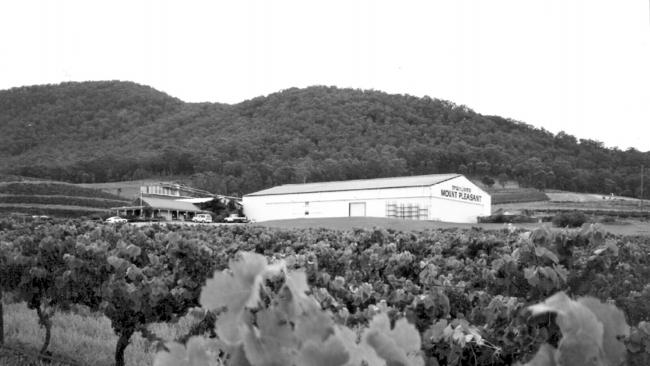
Still, Mr McWilliam believes his offer is compelling, saying it would provide creditors with a “strong return” but provided little more detail.
“Our desire is to see the McWilliam’s business live to fight another day, with a family member leading the charge, rather than being broken up,” Mr McWilliam said.
“There is a lot of goodwill among the McWilliam’s Wines suppliers, staff, customers and consumers, and we are working closely with HLB Mann Judd Sydney, to structure a deal for the Administrators that respects these stakeholders and creates an ongoing relationship into the future, instead of heading down the liquidation path.
“In addition, some of the major shareholders are also important suppliers for the business and under this proposal they will be able to remain so.”
Mr McWilliam said his plans for the business include expanding distribution domestically and, in due course, to new global markets. This is despite McWilliam’s entering voluntary administration in January last year, after recording cumulative losses of close to $90m since FY15. The net asset position of the group reduced from $57.4m on June 30, 2018, to $31.3m on December 31 last year.
11.37am: December trade surplus below estimate
Australia’s December trade surplus was 22pc below the consensus estimate.
The ABS reported a seasonally adjusted surplus of $6.79bn versus Bloomberg’s consensus estimate of $8.75bn.
Exports growth was unchanged at 3pc versus an expected 6pc rise, while imports fell 2pc as expected.
11.36am: Parler CEO ‘fired by donor’
Parler, a moderation-light US social media platform that was forced offline last month by tech giants over how it policed its content, has fired its chief executive.
John Matze, the former CEO, said he was fired on Friday by the company’s board. He said the board is currently controlled by conservative political donor Rebekah Mercer.
“Over the past few months, I’ve met constant resistance to my product vision, my strong belief in free speech and my view of how the Parler site should be managed,” he said in a statement. “For example, I advocated for more product stability and what I believe is a more effective approach to content moderation.”
The immediate impact on Parler’s efforts to restore service to its roughly 15 million users isn’t clear, though a person familiar with the company said that Mr. Matze had been responsible for creating Parler’s original code.
Dow Jones
11.23am: ASX down 0.4pc despite US futures rise
Australia’s share market has continued to slip despite a modest rise in US futures.
The S&P/ASX 200 fell 0.4pc to 6794.3 even as S&P 500 futures rose 0.2pc and NASDAQ futures gained 0.4pc in early APAC trading.
Falls in Transurban and Woolworths added to the early weakness driven by falls in CSL, Origin, AGL, Amcor and Sydney Airport.
John Durie 11.19am: Rinehart grabs lithium stake
Gina Rinehart has followed her son John Hancock onto the Vulcan Energy share register by taking a cornerstone stake in a $120 million placement in the company, at $6.50 a share.
The stock was up 16 per cent at $9.11 a share in early trading after news of the placement.
It has run from $4.96 a share in the middle of last month.
Details of Rinehart’s stake are yet to be finalised but she will be a substantial shareholder.
Vulcan Energy is aiming to become the world’s first zero-carbon lithium producer by producing a battery-quality lithium hydroxide chemical product from its combined geothermal and lithium resource in the upper Rhine Valley of Germany.
The placement of 18.4 million shares by Goldman Sachs and Canaccord increases the shares on issue by 20 per cent.
Hancock is already a substantial shareholder and will participate in the issue, as will chair Gavin Rezos. However chief executive Francis Wedin, who has $110 million worth of stock, will not participate.
The share price has risen as more details emerged of the proposed lithium plant in Germany.
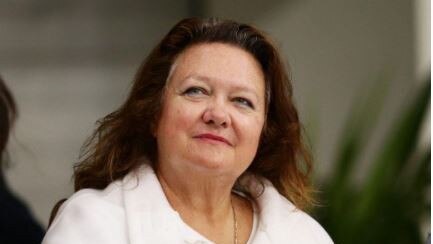
11.11am: Trade surplus may hit record
Australia’s trade surplus may hit a record high in December data, due at 11.30am (AEDT).
Bloomberg’s consensus estimate is for a $8.75bn surplus after a $5.022bn surplus in November.
That would be the second-highest trade surplus on record and not far from the record of $9.771bn set in March.
Preliminary goods exports data suggest the trade surplus should have ballooned out to something in the order of $8.75bn, according to NAB.
10.58am: Watch these diversified financials: CS
Credit Suisse has outlined diversified financials as having the most upside and downside “surprise risk” in the February results season.
On the upside it favours Challenger for a potential earnings guidance upgrade, Magellan for potential positive comments on its Global Fund capital raise and details on the retirement income product, and Platinum because consensus estimates for non-operating items looks too low.
On the downside, it sees ASX giving cautious outlook commentary given low BBSW rates, challenges in ASX24 Derivatives and normalising activity levels, and cautions that with the first half potentially seeing the largest earnings fall in over a decade, this result could also be a “de‐rating catalyst”.
And Computershare faces earnings headwinds from lower margin income, lower UK Asset Resolution fixed fees and higher Mortgaging Servicing Rights amortisation.
“With significant headwinds, ongoing short term challenges in mortgage servicing and guidance implying a large step up in earnings in 2H21 vs 1H21 we see downside risk to FY21 earnings guidance,” the broker says.
Perry Williams 10.43am: Lower wholesale electricity prices ‘to persist’
AGL Energy has signalled materially lower wholesale electricity prices may persist for some time, in a bearish signal for investors looking to pick the bottom of the market, RBC said.
Australia’s largest power generator warned of a $2.68bn hit to first-half statutory profit as it responds to a worsening outlook for wholesale energy prices, triggering a hit on legacy wind farm deals and the value of its power stations.
“What was noticeable was AGL’s view that the outlook for wholesale electricity and renewable energy certificates indicated a sustained and material reduction to prices. This is a change from AGL previously talking to a weak shorter term pricing and an expectation that wholesale electricity prices will have to recover to attract new generation,” RBC analyst James Nevin said.
“For AGL watchers looking to potentially pick the bottom, we think this is bearish. We are of the view that it is hard to see a rebound in prices due to the structural change in wholesale electricity and the continued underwriting of new generation with contracts outside of the spot and futures market in the national electricity market that means additional supply would continue to come online despite low spot and futures prices.”
The accounting charges are non-cash and would mean AGL will recognise lower costs in future years which will flatter future net profit despite underlying cash obligations being little changed, RBC noted.
AGL last down 6.5 per cent to $11.08.
10.30am: ASX slips 0.3pc
Australia’s share market fell slightly in mixed trading after Wall Stalled.
The S&P/ASX 200 fell 0.3pc to 6805.1 after bouncing as much as 5.2pc in three days.
Profit warnings from Origin and AGL pushed their shares down 6.1pc and 5.6pc respectively.
That took a few points off the index, and Amcor fell 3pc despite an upgrade to Buy from UBS.
Other drags included a 1pc fall in CSL and a 1.5pc fall in Sydney Airport and a 4.1pc drop in Saracen Mineral.
But Financials and Resources outperformed with Westpac up 0.3cp and BHP up 0.2pc.
Energy was a standout with Woodside up 1.1pc after WTI crude rose 2pc on supportive comments from OPEC+.
Shares in Nick Scali rose more than 3 per cent on its result, which met guidance, and the bullish outlook statement. Nick Scali in morning trade was up 34.5 cents at $10.945.
Lachlan Moffet Gray 10.16am: Origin downgrades earnings forecasts
Origin Energy has downgraded its full year guidance, citing subdued energy demand due to the impacts of COVID-19 and a mild summer season.
The energy company now expects its energy market full year EBITDA to be in the range of $1bn - 1.14bn, compared to previous guidance of $1.150bn - $1.3bn, a downgrade of 8.6 per cent.
Electricity gross profit is now expected to be between $250m-$290m year on year, compared to the previous expected range of $170m-$220m.
The news sent Origin shares down by 4.8 per cent at the market open.
However, the company has upgraded its LNG production and cash distribution breakeven point, and has issued new guidance on expected earnings.
Production through its Australian Pacific LNG business is now forecast to be in the range of 685-705 petajoules, up 0.7 per cent from the previous guidance of 675-705 pj.
The distribution breakeven point is now $US24 -$US28 per barrel of oil equivalent, down from $US25 - $US29 per boe.
This means the company is predicting cash earnings of $575m - $675m from its LNG business - but natural gas profit is still projected to be between $200m -$250m year on year compared to previous expectations of a $100m-$150m decline.
This reflects the roll off of legacy sales contracts, the repricing of tariffs and lower sales volumes to businesses.
Capital expenditure is also now expected to fall 5.6 per cent from $420-$470m to $400-$440m
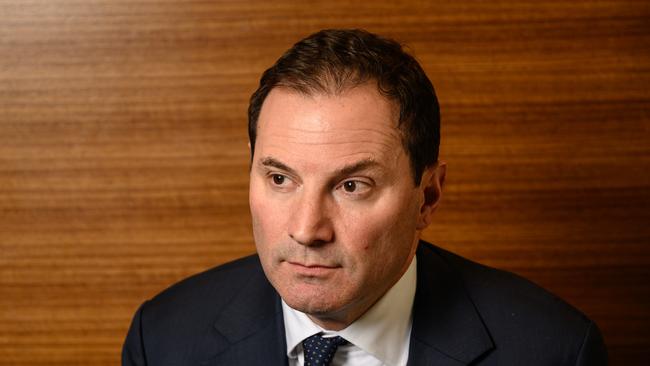
Perry Williams 10.01am: TransGrid blow as rule change rejected
Plans for a $2bn-plus transmission project between NSW and South Australia have been dealt a blow after a push for a rule change allowing investors to secure debt was rejected by the Australian Energy Market Commission.
TransGrid and South Australian provider ElectraNet had requested a rule change after complaining the deferral of revenues under the current framework would not allow it to cover the costs of financing the transmission project known as EnergyConnect.
The two companies wanted changes to the way they recover revenue for big capital investments so they can access cashflows from customers sooner, easing the path for EnergyConnect, the Victorian-NSW interconnector and the Hume Link from Snowy Hydro to southern NSW.
However, the Australian Energy Market Commission said it had found no barrier to financing large-scale transmission projects under current rules.
“Our draft determinations find nothing in the rules to prevent large transmission projects like those identified in the market operator’s integrated system plan from attracting finance,” said AEMC chief executive Benn Barr. “These TransGrid and ElectraNet proposals would cost consumers money and expose them to greater risks.
“Effectively it wants consumers to pay for energy assets as they are being built – like asking motorists to pay tolls on roads before they can be built and used.
“Consumer groups have told us that they are opposed to this, particularly with many families and businesses already stretched by the cost impacts of the COVID pandemic.”
9.56am: Wilsons sees upgrades on Nick Scali
Wilsons analyst John Hynd sees 3-4pc upgrades to consensus forecasts for Nick Scali’s FY21 EBITDA.
While extrapolating its January sales trading commentary for the remainder of FY21 suggests it will be in line with consensus, he notes that the EBITDA forecasts imply a margin contraction of 255bps on a half-on-half year basis.
“NCK had previously advised its sales order book was at an all-time high at 31 December 2020 and that this would translate to material revenue and profit growth in 2H21,” he says.
“Further, $20m of written sales orders in 1H21a would be converted to sales in 2H21. Commentary suggests trading remains strong and the store network expansion is on track.”
Mr Hynd has put his MarketWeight rating and $10.80 target price under review.
9.47am: Australian shares likely to stay firm
Australia’s share market should stay firm amid an improving risk appetite in global markets and a dovish RBA.
Overnight futures relative to fair value suggest the S&P/ASX 200 index will open little changed.
The S&P/ASX 200 is up 3.3pc in 3 days after bouncing as much as 5.2pc on an intraday basis - from a 2-month low of 6517.2 to an 11-month high of 6852.9.
Profit-taking left it slightly below last week’s intraday high of 6832.6 and marginally below last week’s daily close basis high of 6824.6.
But the dip has so far been very limited, as it was in the US market overnight.
Moreover the price action following recent dips below 50-day moving averages in both markets has been encouraging.
And the VIX volatility index looks to be heading for a retest of support near 20pc, favouring equities.
WTI crude oil rose 2pc to $US55.85 after OPEC+pledged to keep pushing quickly to lower the oil surplus.
Spot iron ore bounced 1.3pc to $US152.05 after the recent pullback.
BHP ADR’s equivalent close suggests little change in BHP and Vale’s production guidance tonight will be key for iron ore.
AGL shares will be hit by a $2.686bn writedown though FY21 guidance was unchanged.
Lilly Vitorovich 9.35am: Nine awaits tennis curb news
Nine Network is tightlipped about its TV program contingency plans should the Australian Open be delayed for the second time, after the Victorian government imposes new statewide coronavirus restrictions after a hotel worker tests positive for COVID-19.
Tennis matches on Thursday have been cancelled and more than 600 players and tennis support staff have been ordered to isolate until they return a negative test
Nine’s top radio broadcaster Ray Hadley said on his radio show Thursday morning that if more people in Victoria tested positive it could hit the Australian Open, which is scheduled to kick-off on Monday following a three-week delay.
The grand slam’s delay has already hit Nine’s first-quarter TV program line-up with rivals Seven and Ten targeting TV viewers with their new shows, Holey Moley and The Amazing Race, respectively.
Seven’s quirky minigolf show Holey Moley premiered on Monday night, attracting a national audience of 1.52m, making it Seven’s biggest launch in more than three years, and 983,000 viewers across the five major cities on Monday night.
9.30am: Yancoal pledges loyalty to Australia, coal
Yancoal Australia CEO David Moult will today address the Sydney Mining Club to reaffirm the commitment of the majority Chinese-owned coal miner to Australia, while pledging to keep investing in the coal industry as other miners and domestic funders pull out.
In the presentation Mr Moult will aim to dispel misconceptions about the company, whose majority owner - the Chinese state-owned Yanzhou Coal - retains a 62 per cent stake.
He will stress that the company only has Australian assets and exports to a diverse range of countries, with no market contributing above 26 per cent of revenue.
On the past five years exports to China have accounted for 16 per cent of revenue on average, with Japan the largest customer.
Mr Moult will also reaffirm that the company reinvests its profits within the country or pays dividends to shareholders, and that management is based in Australia and run by Australian nationals.
He will also note that the company paid $590m in taxes in 2019 and may soon be back in a corporate tax payable position following recent losses.
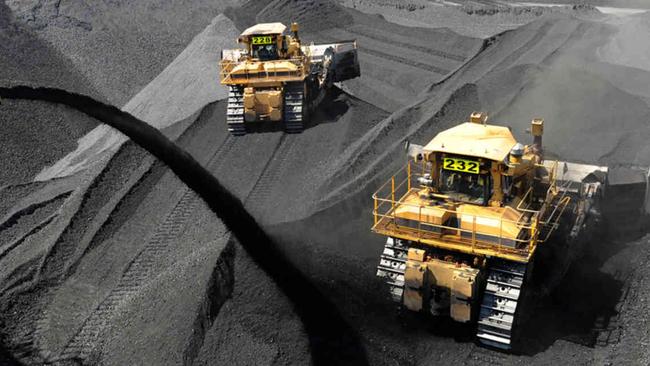
8.51am: Credit Corp names new chairman
Credit Corp has announced the appointment of director Eric Dodd as chairman following the resignation of Donald McLay.
Mr McLay will remain a director of the company.
Lachlan Moffet Gray 8.40am: AGL warns of $2.68bn in writedowns
AGL Energy has warned of a $2.686bn hit to statutory profit following a recent deterioration in long-term wholesale energy prices and “challenging macro economic conditions.”
The company said the charges reflect $1.9bn in onerous contracts relating to its legacy wind farm offtake agreements, a $1.1bn increase to its environmental restoration provision and $532m in impairments across its generation fleet and natural gas assets (net a positive tax effect of $878m.)
The impairment of the natural gas assets is linked to the increase in environmental restoration provisions, the company said.
The impact on profit will be cushioned by a positive tax effect of $878 million, the company said.
AGL Managing Director and CEO Brett Redman said despite the charges the company will still play a leading role in the transition of Australia’s energy system.
“As Australia’s largest energy retailer and largest generator of electricity, we continue to see material opportunities for AGL to participate in the energy transition as customer needs, community expectations and technology evolve,” he said.
“Notwithstanding these charges, our broad and diverse portfolio of electricity generation assets will continue to have a vital role to play in enabling the transition of the energy system.”
Stripping out these one-time items, AGL said its underlying profit forecast of between $500 million and $580 million for the year through June, 2021, remains unchanged.
8.38am: What’s impressing analysts today?
Amcor raised to Buy: UBS
HomeCo Daily Needs REIT started at Buy: GS
Stockland cut to Sell: Morningstar
Treasury Wine cut to Equal-Weight: MS
Adbri raised to Neutral: Macquarie
CSR raised to Neutral: Macquarie
GWA Group raised to Outperform: Macquarie
Lachlan Moffet Gray 8.35am: Nick Scali lifts profit, dividend
Furniture retailer Nick Scali has almost doubled its half year profit and dividend on the back of booming demand for furnishings in the latter half of 2020.
In a statement to the ASX the company said its underlying net profit after tax in the six months to December 31 was $40.5m, up 99.5 per cent on the previous comparable period.
The result was driven by a 24.4 per cent increase in sales revenue to $171.1m and an expansion in gross margin, which boosted earnings before interest and tax by 100.3 per cent to $57.7m.
The company’s interim dividend was lifted from $0.25 cents to $0.40 cents, representing a 80 per cent payout ratio.
Managing Director Anthony Scali the results came despite a multitude of pandemic-led challenges.
“The first half of financial year 2021 had many challenges to navigate including government mandated store closures, supply chain issues and significant delays experienced with global shipping providers,” he said.
“Despite these events, the team was able to capitalise on shifting consumer spending patterns and deliver a record result for the company”.
The company said its online sales had grown strongly and it now expected to exceed the $4m EBIT full year contribution guidance previously given.
Sales momentum continued into the second half of the year, with sales order growth up 47 per cent in January.

8.13am: ASX set to slip at open
Australian stocks are poised to open lower, even as Wall Street mostly edged up.
At about 8am the SPI futures index was down 18 points, or 0.3 per cent.
Yesterday, the ASX surged to an 11-month high.
The Australian dollar is higher at US76.19c.
The price of iron ore is up by 1.3 per cent to $US152.05 a tonne.
Brent crude, the international benchmark for oil, rose 1.7 per cent to $US58.46 a barrel.
8.10am: Qualcomm sales jump on iPhone, 5G demand surge
Qualcomm Inc. capitalised on the global 5G rollout and Apple Inc.’s inclusion of its chips in the latest iPhone models to drive sharp increases in sales and profit.
The mobile-phone chip maker said its quarterly sales rose 62pc from the prior-year period to $US8.24 billion. Net income for the first quarter of the company’s financial year more than doubled to $US2.46 billion.
The company narrowly missed Wall Street’s sales expectations of $US8.27 billion, but beat the bottom line protection of net income of $US2.09 billion, according to analysts surveyed by FactSet.
Qualcomm’s outlook for the current quarter of sales between $US7.2 billion and $US8 billion also topped Wall Street forecasts.
“We remain well positioned as the 5G ramp continues and we extend our core technology road map to adjacent industries,” Chief Executive Steve Mollenkopf said. The company had previously said Mr. Mollenkopf is retiring this year.
Dow Jones Newswires
8.07am: Wall Street closes mixed
US stocks mainly edged ahead for the third straight session as investors continued to turn their attention back to an improving economic outlook and past the recent drama involving GameStop and a handful of other stocks.
The S&P 500 climbed 0.1 per cent after wavering earlier in the day. The Dow Jones Industrial Average also was up 0.1 per cent, or 35 points, while the tech-heavy Nasdaq Composite Index slipped less than 0.1 per cent.
Stock markets have rallied this week, shaking off concerns about stretched valuations, the threat of new coronavirus variants and a sharp run-up in silver and a group of stocks popular with day traders. Investors have focused instead on better-than-expected corporate results, progress in coronavirus vaccinations and bets that President Biden will deliver more fiscal spending in coming weeks.
“The last two days have seen the return of the feeling that we still have monetary stimulus in the background and the prospect of an additional stimulus package to come,” said Seema Shah, chief strategist at Principal Global Advisors. “The path ahead isn’t a smooth one, but we think it is an upward one.”
Giving investors further cause for optimism was fresh economic data that showed continued improvement in the U.S. services sector.
The Institute for Supply Management’s services index for January climbed to 58.7 in January from a revised 57.7 the previous month. Economists surveyed by The Wall Street Journal had anticipated a reading of 57.0.
Investors, meanwhile, reacted to a mixed batch of corporate earnings.
Shares in Alphabet climbed 8.5 per cent after the parent of Google said late Tuesday that it had booked record revenue in the fourth quarter.
Spotify Technology, though, slipped around 8.1 per cent after it offered a cautious view of the year ahead early Wednesday, and Biogen fell 5.3 per cent after it also offered downbeat guidance.
Amazon.com edged down 0.4 per cent. The giant online retailer late Tuesday posted record quarterly sales, marking the first time its revenue crossed more than $100 billion in a three-month period. It also said Jeff Bezos would be stepping down as CEO.
“Earnings have been definitely quite a bit stronger than anyone expected, and they are led by the areas that we have so far seen strength in: the tech sector, the stay-at-home sector,” said Matt Forester, chief investment officer of BNY Mellon’s Lockwood Advisors. “We still have a lot to see, though, particularly in the sectors that have been so heavily impacted by Covid.”
Overseas, the pan-continental Stoxx Europe 600 rose 0.3 per cent. Italy’s FTSE MIB stocks index outperformed other regional benchmarks after former European Central Bank President Mario Draghi was asked to form a new government.
Dow Jones
7.49am: Tilt Renewables fields takeover bids
Wind farm operator Tilt Renewables says it has received a number of non‐binding indicative proposals to acquire the company, following the strategic review by its major shareholder Infratil.
Tilt says it has reviewed the proposals and will grant a number of parties access
to due diligence material to prepare binding proposals.
It told the ASX: “There is no certainty that Tilt Renewables will receive binding proposals or that any proposals received will be recommended to shareholders by the board.”
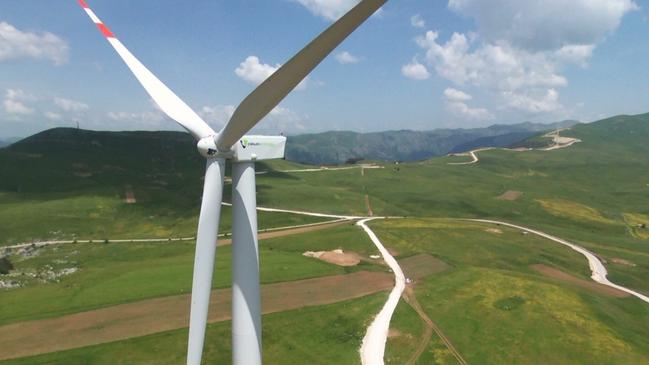
6.50am: Sex toy sales surge spices up lockdown
Sex toy sales have exploded as millions around the world seek to spice up lockdown with new bedroom accessories and Western societies shake off the last taboos around female pleasure.
Berlin manufacturers WOW say their global sales have trebled over the past year. They have shifted more than four million of their most popular model, the “Womanizer”.
Sweden’s LELO says sex toy sales were up 10 per cent in 2020, despite stores being closed.
A report last year by Statista said the global market was set to almost double from $US28.6 billion to $US52.7 billion between 2019 and 2026.
This is about more than lockdown boredom, says Christophe Manceau of market researchers Kantar, pointing to the wider “porno-isation of society”.
“Western societies have reached an era in which sexual well-being is totally normal. Buying a sex toy is no longer taboo at all, quite the contrary,” he told AFP.
AFP
6.30am: US stocks edge up as investor eye earnings, stimulus
US stocks edged higher Wednesday as investors reacted to a mixed batch of corporate earnings reports and tracked the progress in Washington toward another round of coronavirus relief spending.
in afternoon trade the S&P 500 ticked up 0.5 per cent. The Dow Jones Industrial Average was up 0.3 per cent. The tech-heavy Nasdaq Composite Index climbed 0.6 per cent after Alphabet reported strong sales growth late Tuesday.
Stock markets have rallied this week, shaking off concerns about stretched valuations, a sharp run-up in prices for a handful of stocks and silver, a weak economic backdrop and the threat of new coronavirus variants. Investors have focused instead on better-than-expected corporate results, a decline in new coronavirus cases and bets that President Biden will deliver more fiscal spending in coming weeks.
“The last two days have seen the return of the feeling that we still have monetary stimulus in the background and the prospect of an additional stimulus package to come,” said Seema Shah, chief strategist at Principal Global Advisors. “The path ahead isn’t a smooth one, but we think it is an upward one.”
Dow Jones
5.20am: US stocks wobble between gains and losses
US stocks bounced between small gains and losses as investors reacted to a mixed batch of corporate earnings and tracked the progress in Washington toward another round of coronavirus relief spending.
In early afternoon trade the S&P 500 ticked up 0.3 per cent. The Dow Jones Industrial Average was flat. The tech-heavy Nasdaq Composite Index was 0.4 per cent higher after Alphabet reported strong sales growth.
The major indexes remained higher for the week, shaking concerns about stretched valuations, a sharp run-up in prices for a handful of stocks and silver, a weak economic backdrop and the threat of new coronavirus variants. Investors have focused instead on better-than-expected corporate results, a decline in new coronavirus cases and bets that President Biden will deliver more fiscal spending in coming weeks.
“The last two days have seen the return of the feeling that we still have monetary stimulus in the background and the prospect of an additional stimulus package to come,” said Seema Shah, chief strategist at Principal Global Advisors. “The path ahead isn’t a smooth one, but we think it is an upward one.”
Shares in Alphabet climbed 7.3pc after the parent of Google said late Tuesday that it had booked record revenue in the fourth quarter.
Spotify Technology, though, slipped around 8.9pc after it offered a cautious view of the year ahead early Wednesday, and Biogen fell 3.4pc after it also offered downbeat guidance.
Amazon.com edged down 0.2pc. The giant online retailer late Tuesday posted record quarterly sales, marking the first time its revenue crossed more than $US100 billion in a three-month period. It also said Jeff Bezos would be stepping down as CEO.
Some stocks that have soared in popularity among traders on online forums edged higher Wednesday, after suffering sharp reversals in the previous session. AMC Entertainment Holdings rose 10 per cent, having fallen 41 per cent on Tuesday. GameStop climbed 13 per cent, after slumping 60 per cent Tuesday.
Treasury Secretary Janet Yellen has called a meeting with top financial regulators to discuss recent volatility in financial markets related to GameStop, a Treasury spokeswoman confirmed Tuesday night.
Meanwhile, fresh economic data released Wednesday showed further improvement in the U.S. services sector. The Institute for Supply Management’s services index for January climbed to 58.7 in January from a revised 57.7 the previous month. Economists surveyed by The Wall Street Journal had anticipated a reading of 57.0.
In commodity markets, Brent crude, the international benchmark for oil, rose around 2 per cent to $US58.63 a barrel. The gauge is near its highest level since the pandemic rattled global financial markets last spring.
Overseas, the pan-continental Stoxx Europe 600 rose 0.2 per cent.
Dow Jones Newswires
5.10am: Fed’s Bullard expects robust US GDP growth
The Federal Reserve Bank of St. Louis leader James Bullard said vaccines should significantly reduce the threat posed by the coronavirus pandemic over the coming months.
As infection rates from the virus wane, “macroeconomic forecasts suggest very strong U.S. real [gross domestic product] growth for all of 2021,” Mr. Bullard said in materials for a presentation Wednesday. “Downside risk remains, and continued execution of a granular, risk based health policy will be critical to maintain economic momentum,” the official said.
Mr. Bullard, who currently isn’t a voting member of the rate-setting Federal Open Market Committee, didn’t offer any forward-looking views on monetary policy, but he did say in his presentation that “U.S. monetary and fiscal policies continue to be exceptionally effective in mitigating macroeconomic damage.”
Mr. Bullard also noted that the job-market recovery has been much stronger than expected, and what is now a 6.7pc jobless rate could fall to between 4.8pc and 5.4pc this year. “Employment has rebounded more rapidly than expected, supporting the idea that many lay-offs were temporary as firms adjusted to the pandemic,” he said.
Mr. Bullard also said financial markets are expecting higher levels of inflation, which is a good thing given the weakness of current price pressure readings.
Dow Jones Newswires
5.05am: Stocks struggle as oil gushes
Stock markets were mixed as investors juggled developments concerning US stimulus, while oil prices pushed higher into pre-pandemic range.
Equities had started the week strong, rebounding from losses last week as investors began to get cold feet about the narrative that the world economy will bounce back strongly this year thanks to vaccines as vaccination campaigns struggle and new COVID-19 variants emerge.
But the rally faded despite data showing that US private sector jobs rose last month and growth in the service sector accelerated in January.
Chris Beauchamp, chief market Analyst at online trading firm IG, called it a case of good news being bad news.
He said some consider the data “will strengthen the hands of the fiscal hawks on Capitol Hill and give them more firepower in their attempts to water down any Biden stimulus package.” In the US, the Senate on Tuesday took a tentative step towards approving a massive economic aid package proposed by President Joe Biden, although it remains unclear if he will be able to get his $US1.9 trillion plan passed without concessions.
Oil prices pushed ever higher after hitting pre-pandemic levels on Tuesday thanks to data that showed a drop in US inventories.
“Crude’s fundamentals continue to support higher prices,” said analyst Edward Moya at currency trading platform Oanda. He said that for oil prices to rise, stockpiles in the US and China need to continue to fall and that, so far, they have been.
Moya expressed confidence that “the crude demand outlook will improve dramatically in the second quarter.” Recent data has showed infections and deaths in the United States -- the worst-hit country -- appear to be easing.
Experts said this was the result of more people wearing masks and social distancing, along with the end of the holiday season.
Vaccination programs in the United States and Britain were picking up pace, although the European Union was struggling to get up to speed owing to supply problems.
Meanwhile, news that former European Central Bank chief Mario Draghi might become Italy’s next prime minister gave stocks a fillip in Milan. Draghi is credited with saving the eurozone in 2012 at the height of the debt crisis.
London closed down 0.1 per cent, Frankfurt gained 0.7 per cent and Paris ended flat.
In Asian trading, the Hong Kong and Shanghai markets were hit as China’s central bank sucked more cash out of financial markets to avert a bubble.

AFP
5.00am: Daimler plans truck spin-off
German automobile giant Daimler said it planned to spin off and float its truck division, as the maker of Mercedes-Benz pivots to focus squarely on its car business.
“Daimler AG’s Board of Management with the consent of the Supervisory Board today decided to evaluate a spin-off of its Truck and Bus business and begin preparations for a separate listing of Daimler Truck,” the group said in a statement.
Speculation had been rife in recent months about such a listing. Deutsche Bank analysts in January estimated that the spin-off could be worth about 29 billion euros ($35 billion).
The planned listing on the Frankfurt stock exchange will be put to shareholders for approval during an extraordinary meeting likely during the third quarter of the year.
It is expected to be completed by the end of 2021.
AFP
4.55am: Air passengers dropped 66pc in 2020
Global air passenger traffic plunged by an unprecedented 66 per cent in 2020 due to travel restrictions imposed over the COVID-19 pandemic, an industry group said.
The International Air Transport Association (IATA) also warned that the emergence of new, more transmissible variants of the coronavirus were hurting the prospects for recovery this year.
Given that travel restrictions applied mostly to international travel, domestic passenger traffic fared better, dropping by 49 per cent, compared to 76 per cent for foreign passenger traffic.
The travel restrictions imposed during the first wave of the pandemic saw global passenger traffic fall to just five per cent of its normal level, with airlines forced to park planes on runways because not enough space was available.
While traffic picked up during the summer, in December it was down by 70 per cent, thus finishing out the year below average.
IATA, which unites 190 airlines, did not formally lower its outlook for a pick up in traffic this year thanks to a rollout of vaccines, but warned the emergence of new coronavirus darkened the outlook.
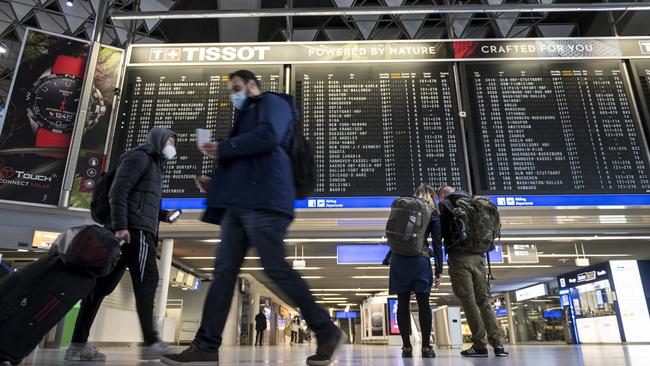
AFP
4.50am: US private hiring rises more than expected
Private employment in the United States increased by 174,000 in January, payroll services firm ADP reported on Wednesday, more than triple analysts’ expectations.
The data provides a preview of the government’s employment report due out Friday that will give the January unemployment rate, and in a sign that the economy’s recovery from the COVID-19 pandemic may be picking up speed, ADP revised its December hiring total upwards.
AFP
4.48am: Spotify losses triple in 2020
Swedish music streaming giant Spotify reported a tripled net loss in 2020, citing increased operating expenses, even as the number of paying subscribers continued to increase.
At the end of 2020, the number of monthly active users was 345 million, a 27-percent increase compared with a year earlier.
Paying subscribers, the main source of revenue for the streaming service, stood at 155 million, a 24-percent increase.
Spotify, which is based in Stockholm but listed on the New York stock exchange, said in October that it hoped to reach between 340 and 345 million active users and 150 to 154 million paying subscribers.
“We believe the pandemic had little impact on our subscriber growth and may have actually contributed positively to pulling forward new signups,” the company said in a statement.
Spotify’s net loss tripled however, to 581 million euros ($US698 million) from 186 million euros in 2019, mainly because of higher operating expenses.
In the fourth quarter, operating expenses grew by 17 per cent from the same period a year earlier as social charges, such as payroll taxes and expenses related to share-based compensation, weighed on the company’s bottom line.
Spotify reported sales of nearly 7.9 billion euros, up by 16.5 per cent year-on-year and in line with estimates from analysts polled by Bloomberg.
AFP
5.45am: Siemens makes change at the top
German industrial giant Siemens prepared to turn a page with a new CEO following a restructuring drive, after a year marked by falling sales due to the coronavirus pandemic.
Chief executive Joe Kaeser was to hand the baton to his deputy, Roland Busch, after a seven-year tenure marked by slimming down and spinning off assets to refocus as a technology company.
Due to shutdown measures, the annual shareholder’s meeting was taking place online, with the handover to Busch to come at the end of the event.
“Our company has a decade of opportunities before it,” Busch said as the gathering kicked off, paying tribute to Kaeser’s run. After reporting full-year to September earnings down by a quarter as the coronavirus battered the global economy, Siemens said it had turned a corner in the first quarter of its financial year.
The Munich-based company, which makes products ranging from trains to factory equipment, saw a 38-percent surge in net profit to 1.5 billion euros ($1.8 billion) in the three months to December.
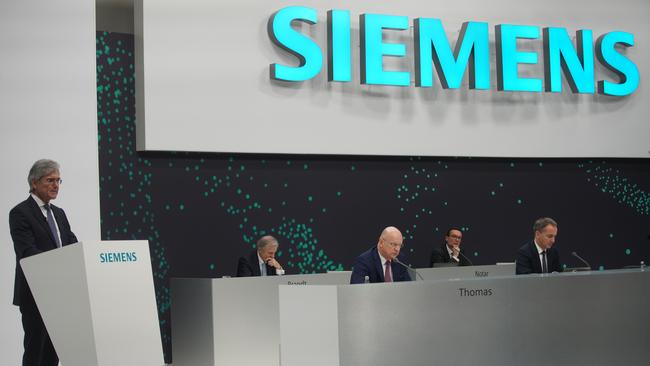
AFP
5.40am: Eurozone inflation back in positive territory
Eurozone consumer prices rose in January for the first time since July, official data said, stoked by rising costs in Germany, Europe’s biggest economy.
The Eurostat agency said inflation in the 19 countries that use the euro hit 0.9 per cent at the start of 2021, a big leap from the negative 0.3 per cent rate a month earlier.
The closely watched core inflation rate, which strips out highly fluctuating prices such as energy and food, also jumped, reaching 1.4 per cent, Eurostat said.
Along with Germany, France and Spain saw consumer prices go back into positive territory, although analysts caution that the extraordinary circumstances of the COVID-19 pandemic make inflation difficult to measure.
In any case, inflation in Europe remains way off the target of the European Central Bank of just under two per cent.
AFP




To join the conversation, please log in. Don't have an account? Register
Join the conversation, you are commenting as Logout